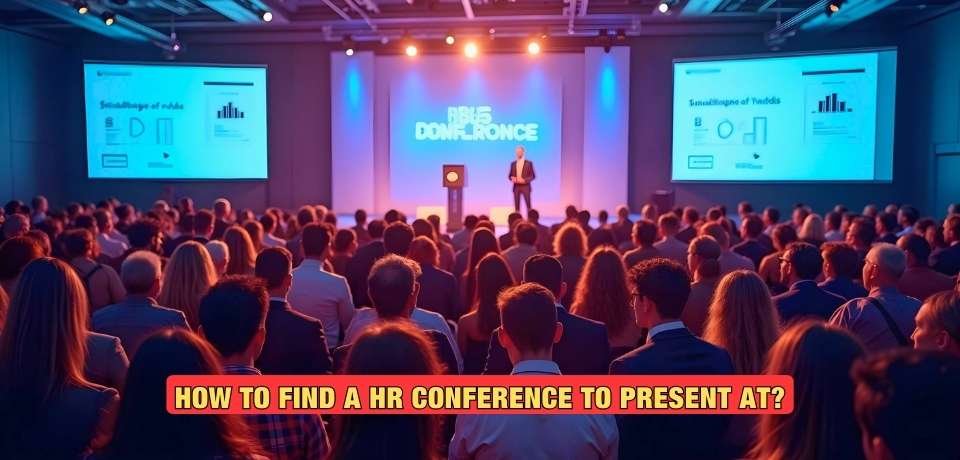HR conferences have become an important meeting place for industry professionals in the rapidly advancing global market. If you’re looking to showcase your expertise, you might wonder how to find a HR conference to present at.
To discover suitable HR conferences, check out event directories and professional networks. Engage with HR associations, follow social media updates, and monitor call-for-speakers announcements. Attending conferences as a participant also helps you connect with organizers and identify potential speaking opportunities.
Do you want to know more about giving presentations at conferences for human resources? Learn all about finding the perfect event in this article. The ultimate guide to advancing your career and building connections.
Why Does Presenting at HR Conferences Matter?
Taking part in HR conferences allows professionals to share ideas, experiences, and stories. It helps attendees learn strategies for solving workplace challenges. Speakers can connect with leaders, recruiters, and innovators to broaden their career network and build long-term relationships for future opportunities in the industry
Public speaking at HR events allows presenters to grow professionally and become thought leaders. They gain credibility by sharing expert opinions. Being on stage in front of key decision-makers offers a chance to make a strong impression and showcase problem-solving skills to the audience.
When preparing for an upcoming HR conference, you should focus on relevant topics to engage listeners. Including real-world examples can help keep the audience interested. Such opportunities not only enhance a speaker’s profile but also increase their visibility in the HR field.
How to Find a HR Conference to Present at?
A careful search and strategic investigation is required to find a HR conference where one can present. With the right steps, you can locate events that align with your expertise and provide speaking opportunities. Below are a number of focused strategies to help you discover suitable HR conferences for your goals.

Research Prominent HR Conferences
Explore directories of top HR conferences and industry publications for event details. Many conferences announce themes, topics, and speaker opportunities on their websites. Regularly check event calendars and industry newsletters for updates. Focus on events that match your expertise and allow you to connect with their audience meaningfully.
Use Professional Networks
Connect with HR professionals to find lesser-known conferences and upcoming speaking opportunities. Networking at industry gatherings or through LinkedIn can provide valuable insights. Professionals in your network may share recommendations or introduce you to event organizers, increasing your chances of finding suitable conferences. Build relationships for long-term benefits.
Follow HR Organizations and Associations
Professional HR associations often host annual conferences or partner with events that need speakers. Their websites, newsletters, and social media platforms feature updates on upcoming events. Joining these associations keeps you informed about speaking opportunities while offering access to a targeted audience in the HR field.
Monitor Call-for-Speakers Notices
Conference organizers frequently release calls for speakers, providing details about their themes and application processes. These announcements often appear on event websites and professional platforms. Subscribing to newsletters and setting up alerts ensures you don’t miss opportunities. Be proactive and ready to submit proposals promptly when notices are published.
Use Social Media for Updates
You can find HR conferences on social media platforms, especially LinkedIn and Twitter. Follow HR-specific accounts, hashtags, and industry influencers to stay updated. Engage with event-related content, as this increases your visibility and might lead to opportunities. Many conferences also share speaker application announcements on these platforms.
Attend Industry Events to Network
Participating in HR-related events helps you connect with organizers and other professionals. Build relationships by introducing yourself and expressing interest in speaking. Many organizers prioritize individuals who demonstrate passion and engagement during their events. Attending first also helps you understand the event’s style and audience needs.
Explore Online Event Platforms
Platforms like HRM Conference and Global Conference Alliance Inc. provide detailed lists of HR conferences. Use filters to search by industry, date, and location. These platforms often feature smaller, niche conferences with fewer applicants for speaking roles, increasing your chances. Bookmark interesting events and revisit them to check for updates.
Seek Recommendations from Colleagues
Your peers and mentors in HR can be excellent sources of conference recommendations. Ask them for their thoughts on events they have been to and express your interest in presenting. Colleagues may know about lesser-known opportunities or events actively looking for speakers. Recommendations from trusted sources often lead to better connections and outcomes.
Focus on Local and Regional Events
Smaller, regional HR events provide excellent platforms to start your speaking career. Check local HR association chapters, universities, or industry groups for upcoming conferences. These events often have less competition and welcome new speakers. Use them to gain experience while building your reputation as an engaging presenter.
Discovering the right HR conference to present at involves research, networking, and consistent effort. By staying active in your industry and using diverse resources, you’ll find opportunities to showcase your expertise. Keep refining your approach, and your dedication will lead to meaningful speaking engagements.
What Factors to Consider When Looking for a HR Conference?
Selecting an HR conference is a key decision for professionals seeking knowledge, networking, and career growth. To ensure the event aligns with your goals, interests, and professional needs, consider several factors. Below are some things to consider when looking for a HR conference:

Relevance of Topics
When selecting an HR conference, explore whether it offers sessions on industry trends and practical solutions. Conferences with engaging discussions on pressing challenges provide the most value. Look for panels and workshops featuring diverse perspectives to gain insights that can be applied in your professional role effectively.
Quality of Speakers
Renowned speakers often deliver impactful sessions with real-world examples and actionable advice. Their expertise adds credibility to the event. Assess if the conference features industry leaders or specialists. Quality speakers can make a significant difference in your learning experience and leave you with valuable takeaways.
Networking Opportunities
A strong HR conference offers diverse opportunities to build meaningful connections with peers, mentors, and industry experts. Engaging with attendees helps expand your professional network. These interactions can promote long-term relationships that bring future collaborations, insights, and career growth opportunities beyond the event.
Location and Accessibility
Consider how easily the conference venue can be reached and whether nearby accommodations suit your needs. A convenient location allows you to focus on the event. Travel logistics, along with the surrounding area’s amenities, should contribute positively to your overall experience and professional goals.
Budget and Value
Knowing your budget is crucial before choosing the right HR conference to attend. Consider registration fees, travel, and accommodations while evaluating the knowledge and networking value it offers. A well-planned budget ensures you maximize learning and connections without overextending your financial resources for the event.
When selecting an HR conference, you must consider how well it fits with your objectives and preferences. Focusing on topics, speakers, networking, location, and budget ensures a rewarding experience that supports your professional development.
Do’s and Don’ts When Applying to Present at HR Conferences
Giving a presentation at an HR conference can be a fulfilling way to network with professionals and share your expertise. Success requires careful preparation and attention to detail during the application process. Below are essential do’s and don’ts to guide your efforts.
Focus on Relevance and Value
Ensure your presentation proposal directly addresses the conference theme and audience’s interests. Providing actionable insights and clear solutions makes your application stand out. Focusing on your topic to solve common HR challenges ensures it resonates well. An engaging and focused approach increases your chances of being selected to present.
Follow Submission Guidelines Precisely
Every conference has specific requirements for proposals, which often include strict formats, word counts, and deadlines. Adhering to these instructions shows your professionalism and attention to detail. Organizers prioritize applications that demonstrate the ability to follow directions. Failing to meet these requirements may result in your submission being overlooked.
Highlight Your Unique Expertise
Conference organizers look for presenters who bring unique perspectives and real-world experience to the stage. Focusing on your niche skills or innovative approaches makes your proposal more compelling. Avoid overly broad topics and highlight your ability to deliver specialized knowledge that attendees can directly apply to their work.
Avoid Overloading with Jargon
Using excessive technical language or buzzwords can alienate your audience and weaken your proposal. Opt for clear, concise, and relatable language that reflects your expertise without overcomplicating ideas. Simple, effective communication demonstrates your ability to engage a diverse audience. A balanced approach makes your application more appealing.
Engage Organizers and Prepare Early
Building relationships with event organizers before submitting your proposal helps establish rapport and credibility. Engaging with conference announcements, participating in networking events, or attending prior conferences can make your name familiar. Procrastinating on your application may lead to mistakes. Begin early and refine your content to improve your chances.
Applying to present at HR conferences demands preparation and attention to detail. By following these strategies, you can craft compelling proposals, stand out, and secure opportunities to share your expertise. Stay proactive, refine your approach, and seize every chance.
What Conference Organizers Look for in HR Presenters?
Conference organizers look for presenters who can deliver valuable insights and engage their audience effectively. A great presenter captures attention, shares meaningful experiences, and leaves a lasting impact. Here are some important qualities organizers typically seek when selecting HR presenters.
- Expertise in HR Topics: Presenters must demonstrate a deep knowledge of HR issues. Organizers look for individuals with specialized knowledge who can offer actionable insights based on real-world experience and current industry trends.
- Engaging Presentation Style: Effective speakers keep the audience engaged with clear, dynamic communication. A good presenter can deliver complex ideas in an easy-to-understand manner while maintaining the attention and interest of the listeners.
- Relevance to Conference Themes: Organizers want speakers whose presentations align with the conference’s main themes. The content should resonate with attendees and address the specific challenges or opportunities highlighted by the event’s focus.
- Strong Communication Skills: Speakers with excellent verbal and non-verbal communication skills are highly valued. Being able to connect with a diverse audience through compelling storytelling and clear explanations is crucial for a successful presentation.
- Audience Engagement Techniques: Conference organizers seek presenters who interact with their audience, ask thought-provoking questions, and use practical examples. This helps keep the session interactive, ensuring attendees are fully involved in the learning process.
- Experience in Public Speaking: A session with an impact is more likely to be delivered by seasoned speakers. Organizers prefer individuals who are comfortable speaking in front of large crowds and have a track record of engaging diverse audiences.
- Clear Learning Outcomes: Presenters who define clear learning outcomes help organizers ensure the conference adds value to attendees. Organizers look for speakers who outline practical, tangible takeaways that attendees can apply in their professional lives.
Conference organizers seek HR presenters who can inspire, educate, and engage an audience. A strong presentation that aligns with event themes, offers valuable insights, and connects with attendees makes a presenter stand out as an ideal choice for any HR conference.
How to Prepare for Your HR Conference Presentation?
Preparation is key to delivering a successful HR conference presentation and ensuring a meaningful connection with your audience. With thoughtful planning, you can strengthen your confidence and maximize your impact. Below are actionable tips to help you excel.

Know Your Audience’s Needs
Research the audience’s demographics, roles, and interests to prepare a presentation that aligns with their expectations. A targeted approach ensures that your content resonates effectively. Knowing their challenges allows you to provide valuable insights, making your session impactful and engaging for attendees.
Structure Your Content Effectively
A well-organized presentation with clear sections helps keep the audience focused and engaged throughout. Use an introduction, main points, and conclusion to guide your talk seamlessly. Highlight actionable takeaways to ensure your audience benefits from the session and applies your insights effectively.
Practice to Build Confidence
Regular rehearsals improve your delivery, timing, and familiarity with the content. Practice with colleagues or record yourself helps refine your approach. Confidence in your delivery increases audience trust and ensures you stay on track. This preparation is essential for getting the most out of an HR conference experience.
Use Visuals Wisely
Incorporating visuals enhances performance and makes your presentation more appealing. Limit text on slides to key points for clarity. Charts, graphs, and images can highlight critical data effectively, keeping the audience engaged. Overloading visuals with information might distract from your core message.
Engage and Interact with Your Audience
Interactive elements, such as Q&A sessions or polls, make your presentation dynamic and memorable. Encourage participation to create a two-way conversation that encourages learning. Interaction builds rapport with attendees, making the session enjoyable and productive for everyone involved.
Preparing for your HR conference presentation ensures confidence, clarity, and impact. By focusing on audience needs and refining your delivery, you can create a meaningful experience. Stay committed to preparation and enjoy the rewarding process of sharing your expertise.
Tips to Handle Q&A Sessions at HR Conferences
Handling a Q&A session effectively is crucial for HR professionals at conferences. It allows you to engage with the audience, clarify any doubts, and showcase your expertise. Being prepared and confident is key to making a positive impact. Below are helpful tips for managing the Q&A portion smoothly.
Be Prepared for Difficult Questions
Before the session, anticipate possible challenging questions that may arise. Think of clear and concise answers to complex topics. Practice responding to tough queries to stay calm and composed during the session, showing confidence in your knowledge.
Stay Calm and Confident
When faced with questions, you should remain calm. Pause for a moment to collect your thoughts before responding. A confident demeanor not only strengthens your credibility but also reassures the audience that you’re in control of the discussion.
Listen Carefully Before Responding
Do not interrupt and actively listen to every question. Ensure you fully know the question before formulating an answer. Responding thoughtfully shows respect for the audience and provides more valuable, relevant insights into your answer.
Keep Your Answers Concise
When answering questions, try to be brief and to the point. Avoid over-explaining or going off-topic, as this can confuse your audience. Clear, concise answers help maintain the flow of the session and respect everyone’s time.
Encourage Engagement and Follow-Up
Invite further questions from the audience if time allows. Encouraging participation can make the session more interactive. It also helps attendees feel involved, allowing you to address more specific concerns and provide additional insights on relevant topics.
Acknowledge When You Don’t Know an Answer
If you don’t know the answer to a question, be honest. It’s better to acknowledge it and offer to follow up after the session. Transparency and honesty build trust with your audience and show humility as a speaker.
Handling Q&A sessions at HR conferences requires preparation, calmness, and clear communication. Following these tips will help you manage questions effectively and create a positive experience for both yourself and the audience, improving your credibility as a speaker.
How to Gather Feedback From Your HR Conference Sessions?
To improve your presentation and content, you must collect feedback from your HR conference sessions. It helps understand the audience’s views and identifies areas for growth. Collecting input after each session provides valuable insights for future events. Here are effective methods to gather feedback.

Use Feedback Forms
Distribute feedback forms at the end of your session to gather clear insights. Keep them simple, focusing on key areas like content relevance and presentation style. Include both rating scales and open-ended questions, ensuring you get detailed information about what worked and what could be improved.
Conduct Live Polling
During your session, you can get instant feedback by using live polling. Use interactive tools to let participants share their thoughts in real-time. This helps adjust your presentation on the spot and provides instant insights into audience engagement and whether they find the content relevant.
Encourage One-on-One Conversations
Speaking with attendees individually after the session gives you deeper, more personal feedback. These conversations allow attendees to express their thoughts in detail, often revealing areas they may have missed. Direct interaction offers valuable insights that surveys and polls might not capture.
Use Digital Platforms for Feedback
Digital platforms make collecting feedback easy and accessible. If your conference uses an app or website, ensure your session is included for feedback submission. These platforms can provide real-time responses, allowing you to gather input from a broader audience and track patterns more efficiently.
Offer Incentives for Feedback
Encourage more people to share their thoughts by offering small incentives, like future event discounts or exclusive resources. Incentives increase participation and engagement, motivating attendees to provide more detailed and honest feedback, making it a mutually beneficial process for both you and your audience.
Collecting feedback after your HR conference session helps you refine your content and improve for future presentations. By using a variety of feedback methods, you can ensure that you understand what resonated with your audience and what can be improved.
Frequently Asked Questions (FAQs)
It can be difficult to choose which HR conference to present at, but knowing the steps makes the process easier. Below are common questions with practical answers to help you secure meaningful speaking opportunities and stand out in the HR industry.
What Are Niche HR Conferences And Why Should I Consider Them?
Certain facets of human resources, such as hiring, compliance, or employee engagement, are covered by niche HR conferences. These events often have less competition for speaker slots. Presenting at niche conferences allows you to connect deeply with an audience focused on your expertise, creating a stronger impact and lasting impressions.
How Can I Use Referrals To Find Speaking Opportunities?
Referrals from colleagues or industry contacts can open doors to speaking engagements. Share your goals with trusted peers and mentors who are familiar with conferences. Their recommendations may lead to opportunities not widely advertised. A strong referral often boosts your credibility with event organizers and improves your chances.
Are Virtual HR Conferences Worth Presenting At?
Due to its special advantages, virtual HR conferences have become more and more popular. They provide global reach and allow you to connect with a diverse audience. These events often have flexible speaking slots and lower costs. Presenting virtually builds your reputation while saving time and resources, making it a valuable opportunity.
How Can Networking At Smaller Events Lead To Bigger Opportunities?
Attending smaller HR events lets you build connections with organizers and attendees in an intimate setting. These relationships can lead to invitations for larger, more prestigious conferences. Engaging with others at smaller events helps showcase your expertise and demonstrates your potential as a capable presenter.
What Role Does Social Media Engagement Play In Finding Conferences?
Active participation on social media platforms helps you discover speaking opportunities. Following HR influencers, engaging with conference posts, and sharing your insights on relevant topics increase visibility. Organizers often notice active professionals who engage online, which can lead to direct invitations or valuable referrals for speaking slots.
Bottom Line
Finding the right HR conference to present at can be a fulfilling journey that improves your professional growth. Sharing your expertise with a dedicated audience not only builds your reputation but also encourages meaningful connections within the HR community.
To address how to find a HR conference to present at, focus on exploring event directories, connecting with professional networks, and monitoring calls for speakers. Engaging with HR associations and participating in events as an attendee can also help you discover excellent opportunities relevant to your expertise.
As you prepare for this rewarding experience, stay proactive, craft compelling proposals, and build strong relationships in the industry. Keep refining your approach, accept new challenges, and best wishes for your successful career as a dynamic HR presenter!
